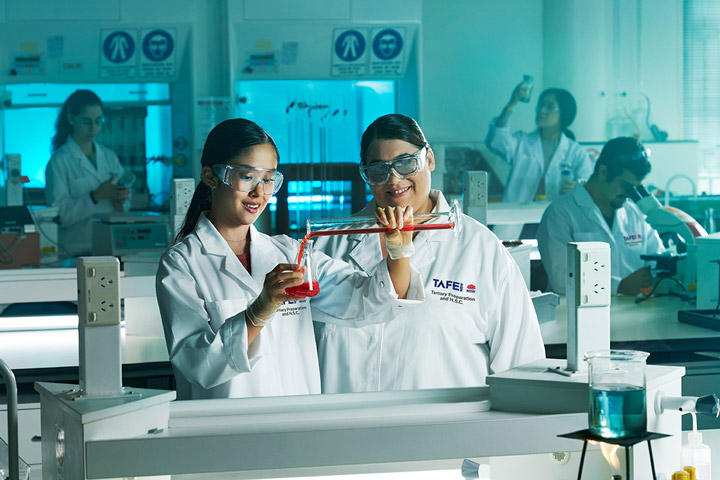Skip to main content
Start quiz
- Go to homepage
- Course areas
- Laboratory Science
- Diploma of Laboratory Technology (Pathology)
Back to:Laboratory Science

Overview
About this course
Embark on a rewarding career in medical diagnostics as a laboratory technical officer or technical assistant and make a real difference in patients’ lives. Gain an understanding of how disease states in the body are diagnosed and treated.
Outcomes
What you'll gain
Learning outcomes
Through a mixture of theory and practical course work, learn to:
Understand disease states in the body and how they are diagnosed and treated
Identify different types of bacteria and choose the appropriate antibiotics for treatment
Use up-to-date laboratory machinery and equipment, including microscopes
Collect and prepare tissue samples for analysis to detect cancers
Follow work, health and safety procedures, including disposing of infectious waste and contaminated samples
Analyse blood samples for disease states and genetic abnormalities
Course outcomes
Gain practical experience and develop specialist skills that give you an advantage in the job market.
A nationally accredited diploma
Extensive practical experience working in a laboratory environment
The confidence and specialist skills to work independently and as part of a team to perform a variety of pathology tests and procedures
The skills to work safely and independently as a qualified laboratory technician
Extensive knowledge of disease states in patients and how they are treated
Suitability
Is this course right for you?
Entry requirements
This course requires evidence of previous experience or study before you can enrol.
This course can be completed as part of a traineeship. Enquire today to check the eligibility requirements.
Completion of the Certificate IV in Laboratory Techniques as evidenced by a copy of your transcript or certificate, or
Completion of a Certificate IV or higher in a relevant science, technology, engineering or mathematics (STEM) discipline, as evidenced by your transcript or certificate, or
You have technical laboratory skills, knowledge and employment experience as evidenced by a resume highlighting your experience in the area
Completion requirements
During your study you’ll need to provide your teacher with the following evidence:
Entry recommendations
To be prepared for this course, we recommend that you have:
Language, Literacy and Numeracy (LLN) at a Year 12 high school level
Note:
TAFE NSW may ask you to complete a Language, Literacy and Numeracy (LLN) skills test. This helps us to understand your individual study needs, to design an individualised plan that supports your study success and ensures your LLN skills match the demands of the course.
We tailor our courses to meet local community needs, so some campuses may have extra entry requirements. Check your preferred location for details. Need help preparing? Contact us for support.
Find Your Fit
This simple tool guides you to a suitable course level based on your foundation skills and confidence.
Pathways
Future career and study options
Career pathways
Our graduates go onto roles like: laboratory technical officer and laboratory technical assistant.
Study pathways
Take your study further with other courses offered at TAFE NSW:
Previous study0 Courses
Begin here to gain experience and confidence in this study area.
The Diploma of Laboratory Technology (Pathology) does not have any pre-requisite courses.
Further study0 Courses
Advance your skills to take your career to the next level
The Diploma of Laboratory Technology (Pathology) does not have any post-graduate courses.
Related study4 Courses
Strengthen your expertise and gain specialist skills to expand your employability.
Your experience counts
At TAFE NSW, we recognise your previous study and work experience. You can apply for recognition of prior learning or a credit transfer with any of our courses. If you're successful you'll get your qualification faster.
Units
Units taught in this course
Courses are made up of a combination of both core and specialty units. In the Diploma of Laboratory Technology (Pathology) qualification, you’ll need to successfully complete 18 units of competency, including 5 core and 13 speciality units.
Please note, not all specialty units are offered at every TAFE NSW location. It is highly recommended that you check with your preferred campus for information about the specialty units offered at that location.
Core units - 5
Core units are central to the job outcomes of a particular industry or occupation. These are the units industry has agreed are essential to be capable and qualified at a particular study level.
Process and interpret dataMSL924005
Use laboratory application softwareMSL924006
Maintain instruments and equipmentMSL934008
Apply quality system and continuous improvement processesMSL934009
TAFE NSW services
Facilities and support
TAFE NSW provides support services across all campus locations and online. Whatever your needs or circumstances, we have the people, resources, counselling and facilities to support you in focusing on your studies.
TAFE NSW Disability Support Service
TAFE NSW Language, Literacy and Numeracy (LLN) support
TAFE NSW Aboriginal Support; Learner support (ABE)
TAFE NSW Careers, Counselling and Pathways Service
TAFE NSW Libraries
Scholarship programs - be supported as you explore your talents and fulfil your potential
Read&Write literacy and study support software is available free for all TAFE NSW students to use while studying on campus and at home
LinkedIn Learning - an online resource which offers innovative courses and tutorials to improve your personal and professional skills
Student associations - get social with our student community
Study options